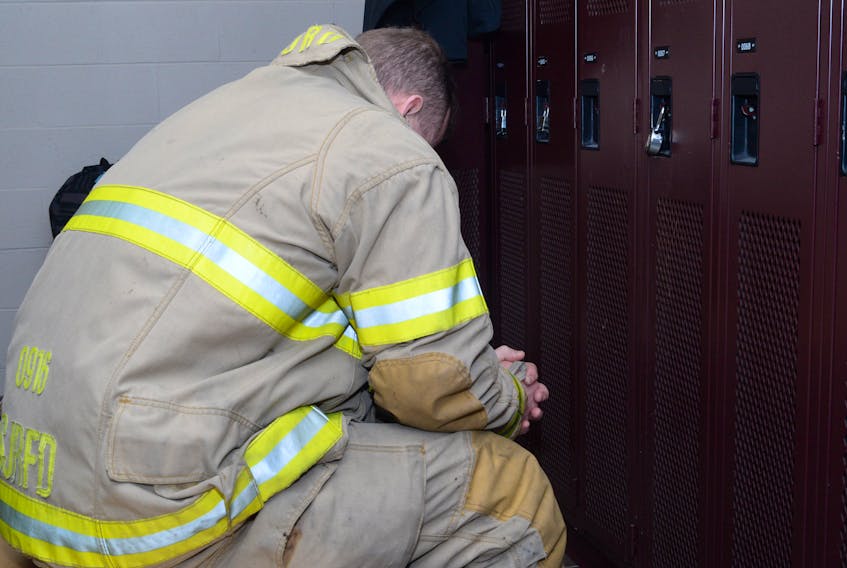Being a first responder is what firefighters, police officers and paramedics sign up to do.
They are trained and ultimately prepared for all the tragic things they may encounter as they conduct their respective duties.
But no matter how inclusive their training is or how tough they may believe their resolve is, the first responders can’t forget the gruesome things they encounter.
“The stresses faced by firefighters throughout their careers – incidents involving children, violence, the dangers of firefighting and other potentially traumatic events – can have a cumulative impact on their mental health and well-being,’’ Craig Smith, president of the St. John’s Fire Fighters Association Local 1075 said.
The St. John’s Regional Fire Department has instituted programs and services which will help its members deal with those issues as they have long recognized the need for all of its members to undergo some form of counselling or debriefing to help cope with these situations.
This program — Road to Mental Readiness (R2MR) — is the latest incarnation of mental health therapy for firefighters in an attempt to provide everyone in fire services with the tools to deal with critical incident stress management situations, a program they have employed at the SJRFD since 1989 when the initial policies were introduced.
“Mental Health has become a priority. A lot of attention has been paid to it over the past five years,” SJRFD occupational health nurse Helen Williamson said.
“Through education, we hope to identify people to come forward earlier, rather than later,’’ she added noting there are six people designated as trainers with the SJRFD who will conduct additional training for firefighters between now and June.
Those stresses faced by firefighters could include incidents involving children, violence, the dangers associated with firefighting and other traumatic events that all could have a cumulative impact on mental health and well-being.
To counter these issues and provide firefighters with an outlet for their stresses, peer support programs are proven to be an effective method of support to firefighters.
“We all seek help for a physical injury and mental health can be no different,’’ Smith said.”
“We have always emphasized physical fitness as a key to personal health, but we also have to recognize that mental health is important as well,’’ he added.
Smith said the firefighters who have completed the training are more enlightened and the program shows the No. 1 priority is the health and well-being of everyone.
“There is nothing but good things being said about this from all those who have completed the sessions,’’ he said.
The hope is that by identifying signs of stress early on, firefighters and support staff can manage stress and diffuse it before it turns into something more serious, like post-traumatic stress disorder (PTSD) or Post-Traumatic Stress Injuries (PTSI).
PTSI is a biological injury that develops after a person has experienced or witnessed a terrifying event.
The Canadian military has its own designation for its classification of post-traumatic stress as an Operational Stress Injury and incorporates PTSD and PTSI into one classification.
And dealing with these delicate situations and acting before one of these injuries can be triggered is the goal of the program.
“We hope that we can identify people in the early stages be it green, yellow, orange or red levels and where those people are on the spectrum based on the colour assigned to them,’’ she said.
Green designates being healthy and happy and red not so much as those in that range are the most likely to lash out, shirk duties and turn to alcohol or drugs as a coping mechanism.
She said captains, platoon chiefs and lieutenants completed training at SJRFD in November and are now equipped to train additional support staff and conduct sessions with the firefighters to ensure they understand the Road to Mental Readiness program and procedures.
“Mental health is no different than physical health, that is the message people are struggling to accept. We need to make sure the barriers are dropped so they are not embarrassed or reluctant to come forward,’’ she said.
“And everything is done on a confidential basis so they are not embarrassed.”
And to be proactive, the SJRFD has hired a behavioral health co-ordinator, someone who is already known to the firefighters in Aubrey Vincent, the department’s chaplain.
His job will be to administer the R2MR program by visiting stations to conduct critical health management sessions.
“From time to time, we can all use help,” SJRFD Deputy Chief Don Byrne said.
“While we have our differences on some issues, when it comes to doing what is best for the service, we have circled the wagons and said here is what is important,” he added.
For being just more than 90 days into the program, Byrne says approximately 60 per cent of the firefighters in the St. John’s region have received training and he expects everyone will have had a course by the first of June.









